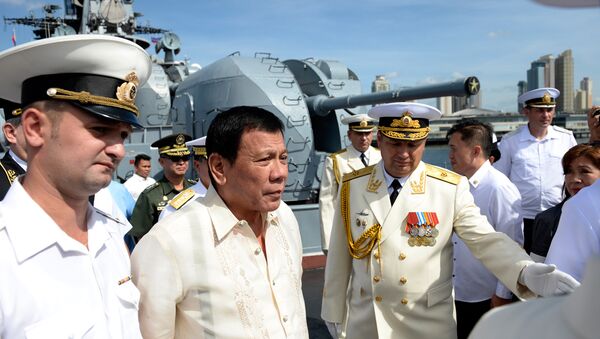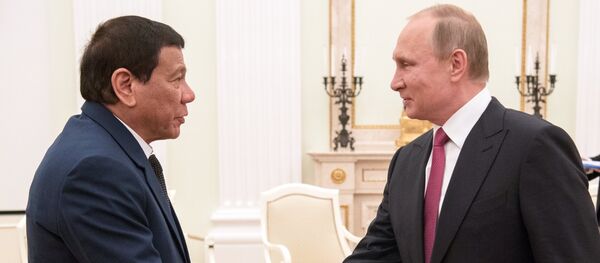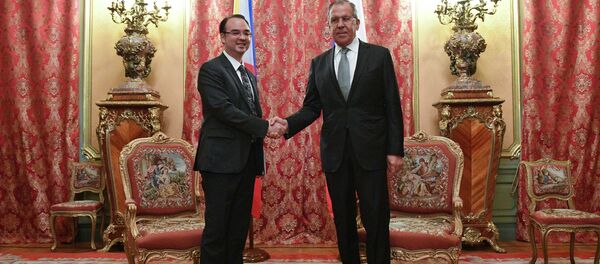MOSCOW (Sputnik), Tommy Yang — Restrictions contained in the Philippine constitution may stop President Rodrigo Duterte from purchasing advanced and more expensive weaponry from Russia, experts told Sputnik.
Education vs Military
Commenting on possible financial assistance from the Russian side on military hardware purchases, Philippine Foreign Secretary Alan Peter Cayetano stressed the country’s financial difficulties at a press conference in Moscow.
"The Philippines, being a developing country, may not have the finances to pay for what we need now. That’s another way of saying that grants, soft loans, concessional loans are welcome," Cayetano said.
Cayetano added the Filipino president was primarily interested in modern military equipment to help the country’s armed forces fight terrorism and prevent collateral damage. He stressed that the Philippines is not establishing a military alliance with Russia.
However, experts suggested that restrictions under the constitution of the Philippines may be the real reason preventing Duterte from buying advanced weaponry such as submarines or frigates for the nation’s under-equipped navy.
"The Philippines does not have a problem paying (for more advanced equipment). But under the country’s constitution, Manila’s military spending cannot be larger than its spending on education," Richard Javad Heydarian, an assistant professor in international affairs and political science at De La Salle University in Manila, Philippines, said.
After an almost 18-percent jump in military expenditure from the previous year, the 2017 national defense budget for the Philippines stood at $2.76 billion. This accounts for about 4 percent of total government spending. At the same time, the Department of Education will receive $10.97 billion, or 15.2 percent of the 2017 national budget, up 25 percent from the previous year.
Official figures showed that the Philippine GDP in 2016 was about 1.5 times larger than the GDP of Vietnam in the same year. As one of Asia’s fastest-growing economies, the Philippine GDP grew 6.8 percent in 2016 while Vietnam’s GDP rose 6.2 percent during the same period, according to the two countries' government figures.
But Vietnam’s defense spending topped $5 billion in 2016, about twice the military budget of the Philippines for 2017. UK-based defense research firm HIS Jane’s estimated that Vietnam’s military expenditure is expected to expand to $6.2 Billion by 2020.
Vietnam reached an agreement with Russia to buy a total of six submarines for $2.1 billion in 2009. The sixth improved Kilo-class (Project 636) Russian submarine, named HQ-187 Ba Ria-Vung Tau, arrived at the Cam Ranh port in southern Vietnam's Khanh Hoa province in late January.
The Kilo-class submarines are newly manufactured models referred to as the "black hole" by the US Navy due to their advanced stealth capabilities. With a maximum depth of 300 meters, the HQ-187 can stay at sea for 45 days without refueling and can sink or cripple larger vessels with its anti-ship weaponry.
In comparison, the latest addition to the Filipino navy was a 50-year-old Hamilton-class frigate, renamed as the BRP Andres Bonifacio, used to be in service of the US Coast Guard. US military analyst Robert Beckhusen wrote that this ancient vessel belongs in a museum.
Away From Depending on US
Duterte’s willingness to build closer military ties with Russia mostly served the purpose of moving away from the nation’s excessive dependence on the United States, experts said.
"By strengthening relations with Russia, Duterte is seeking a more independent foreign policy and break free from his nation’s dependence on the US," Fabrizio Bozzato, an associate researcher specialized in international affairs at Tamkang University in Taiwan, said.
The Philippines and the United States signed the Enhanced Defense Cooperation Agreement (EDCA) in 2014, to advance the implementation of the MDT. The EDCA came amid rising tension in the South China Sea and the US-Philippines alliance strengthened to a new level unseen since the Cold War. The EDCA would give US troops extended access to Philippine military facilities.
Unlike his predecessor Benigno Aquino, Duterte downplayed the territorial dispute with China over the Spratly Islands, despite the Hague-based Permanent Court of Arbitration unanimously ruling in favor of the Philippines in 2016. Facing an increasing Chinese military buildup on the islands, Duterte refrained from the hostile rhetoric seen under his predecessor. Instead, he chose to seek active dialogue with China on the dispute.
Bozzato suggested that as Duterte built stronger ties with Russia and China, both permanent members of the UN Security Council, the United States will also have to show their support for the Philippines.
"The Trump administration has to reassure Manila on the resilience of their alliance. They have to show support not only for Philippines, but also for Duterte," Bozzato said.
The researcher also noted that there is a clear distinction between Russian and Chinese strategies in Southeast Asia.
"Russia is definitely not willing to irritate China. For Russia, the logic is simple: the enemy of my enemy is my friend," said Bozzato.
Philippine foreign secretary Cayetano also stressed in Moscow that Russia does not have a military interest in Southeast Asia.






